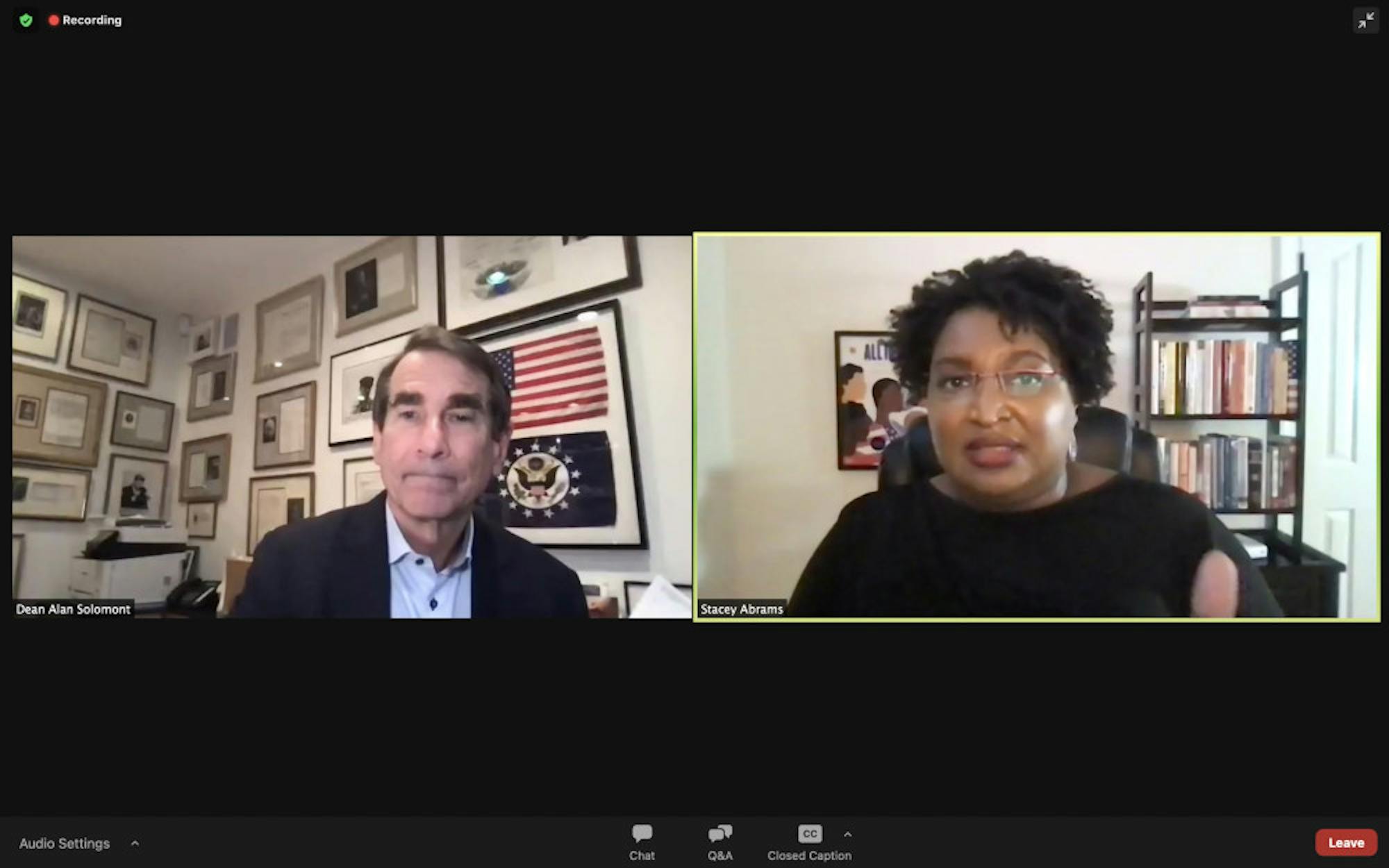Stacey Abrams spoke to the Tufts community about her journey into politics, grassroots organizing in Georgia and youth civic engagement in a livestreamed conversation on Thursday.
Abrams, a voting rights activist, politician and author, was invited to speak as part of the Jonathan M. Tisch College of Civic Life Distinguished Speaker Series.Abrams served in the Georgia House of Representatives from 2007–17 and was the Democratic nominee in the 2018 Georgia gubernatorial election.
Kelly Sims Gallagher, academic dean and professor of energy and environmental policy at The Fletcher School, opened the event.
“Stacey Abrams is the embodiment of courageous and ethical leadership,” Gallagher said. “She recognizes the inherent dignity in every person and has held our institutions and leaders accountable, most recently in the 2020 election.”
Alan Solomont, dean of Tisch College, moderated the event. He began by asking Abrams about her heroes.
“My parents are extraordinary people,” Abrams said. “They grew up in the abject poverty that you think about in Mississippi, during Jim Crow.”
Abrams then discussed her route to politics. Growing up in a family committed to social justice, she often missed the Saturday morning cartoons when accompanying her parents to protest, vote and volunteer at local soup kitchens, homeless shelters and juvenile justice facilities. Abrams said she was influenced by lessons her parents taught her.
“[My parents] said, 'Look, it's government's job to do many of these things for people who have fallen through the cracks,’" Abrams said. "'It's government that should be trying to solve the challenges of poverty and literacy' … I was really mad at government because government was making sure I didn't get to watch the Super Friends [cartoon].”
When asked what advice she has for students hoping to become involved in politics, Abrams said that politics should be a tool for policy, not the other way around.
“The minute we start making choices so we can win elections, instead of winning elections so we can make better choices, you have fallen far afield from what should be driving here,” she said.
Abrams said that much of her success in Georgia was the result of the mathematics of changing demographics as well as the strategy of a 10-year plan she formed a decade ago.
“I put together in 2010 … this 10-year plan, and it really did track the trajectory of voting and the trajectory of demographic changes,” Abrams said. “It was doing that work that led to a lot of the outreach that I built, both as leader organizations that I started, including The New Georgia Project, investment in younger people to go into [communities] and build operations but also training them to run campaigns and to think about policy.”
Abrams emphasized local politics in discussing how to expand her strategy to other states. She said that it is important not to wait until presidential election years, which often have high voter turnout but low return on investment, to become civically engaged.
“For most people, the challenges that they face in their lives for the communities we need to engage, they feel the pain at the local level,” she said. “It's whether or not the school board decided that they needed access to the internet, when they decided to go to remote learning.”
Abrams added that this process takes time and that it is important not to get dissuaded by a lack of instant results. Instead, it is important to be clear about what was accomplished and what remains to be solved.
Abrams also discussed her work to involve more young people in the voting process.
“Part of what I saw as my responsibility as [Georgia House of Representatives minority] leader was to help build the party and to build that party infrastructure,” she said. “Sometimes we eschew the idea of political parties and that apparatus, but it's an amazing organizing model. It is one of the most effective ways to hire young people to learn about politics but also to do politics.”
Abrams said that internships were critical for teaching young people about the political process. She discussed how meeting young people where they are — for instance, at Dragon Con in Atlanta — is crucial to expanding the electorate.
“For the course of my seven years as [Georgia House of Representatives minority] leader, we had more than 400 interns that we brought in, and we trained them on public policy during session, and then we trained them on politics when we were out of session,” Abrams said. “That created a whole cadre of operatives who could actually work within their communities to help other young people learn about politics and do the work.”
Solomont mentioned Abrams' persistence even after losing the 2018 gubernatorial race, citing that 91% of Black women voted for President Joe Biden. He said women of color, particularly Black women, are often crucial to democratic politics, especially in the South. He asked Abrams how she navigated the setbacks in this kind of work.
“Almost every societal ill, every social malignancy, every political fallout consequence hits Black women, it hits Black communities, it hits communities of color," Abrams said. "We are the victims of bad decision making and, worse, of intentional decision making that dehumanizes and discounts our role and our responsibilities and our right to active engagement."
When asked about voter suppression, Abrams said that we must not forget the legal implications of the Jan. 6 attacks on the Capitol.
“I am not being hyperbolic at all when I say that the insurrection that failed in January is continuing through legislative imprimatur across the country,” she said. “There's nothing permanent about victories and voting rights.”
The conversation concluded with Abrams' taking questions from the audience, during which she discussed barriers to civic engagement, her motivations in public service and actionable steps that students can take to encourage civic action and voter participation.






